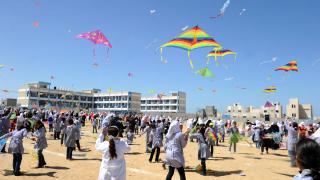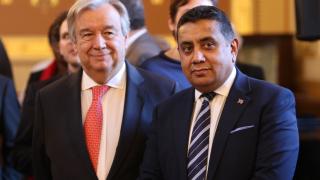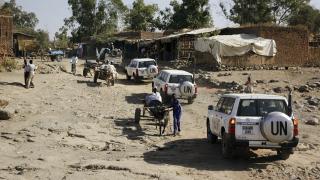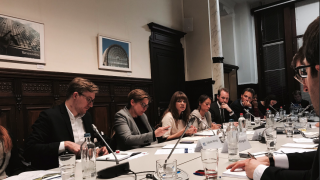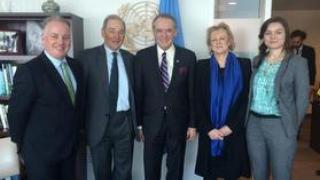
A delegation from UNA-UK travelled to New York and Washington last week to investigate the UN’s perspective on the Responsibility to Protect (R2P) and the US approach to atrocity prevention.
Representing UNA-UK in the United States was Chairman Sir Jeremy Greenstock and Peace and Security Programmes Officer, Alexandra Buskie. They were joined by Lord McConnell of Glenscorrodale and Baroness Hodgson of Abinger - both key Parliamentary figures working on atrocity prevention and gender issues in the UK and abroad.
The trip was the culmination of months of planning and preparation by UNA-UK’s R2P programme. UNA-UK produced a number of internal background papers to ensure members of the delegation were well briefed on the current status of R2P and worked hard to set up meetings with key international contacts within the UN and US policy communities.
The representatives first travelled to New York to attend a range of meetings at both the UN and with members of the R2P policy community, such as the Global Centre for R2P. In these meetings, UN officials – including Deputy Secretary-General Jan Eliasson and Adama Dieng, Special Adviser for the Prevention of Genocide - expressed a strong and on-going commitment to R2P, emphasising the crucial role played by the Rights Up Front initiative in advancing atrocity prevention internationally.
Delegates then moved on to Washington to discuss the importance and impact of atrocity prevention in US policy. In particular, the delegation met with members of the US Atrocity Prevention Board (APB) (an Obama Administration initiative designed to bring together Government departments to work on this issue), representatives of the National Security Council, as well as civil society groups.
The APB was hailed as a quiet success story, playing a key role in coordinating policy and gathering expertise across Government on the issue of atrocity prevention. Delegates were also briefed on the struggles faced by the APB in measuring and publicising its impact to Congress and the American public. As a result, general knowledge on the APB and its role remains low, despite the importance of its work.
A full report of the trip and its findings will be published by UNA-UK in the coming months. For further information on the APB and R2P, download the following briefings produced by UNA-UK.
Photo: UNA-UK's delegation with Jan Eliasson (centre). Copyright: UNA-UK

